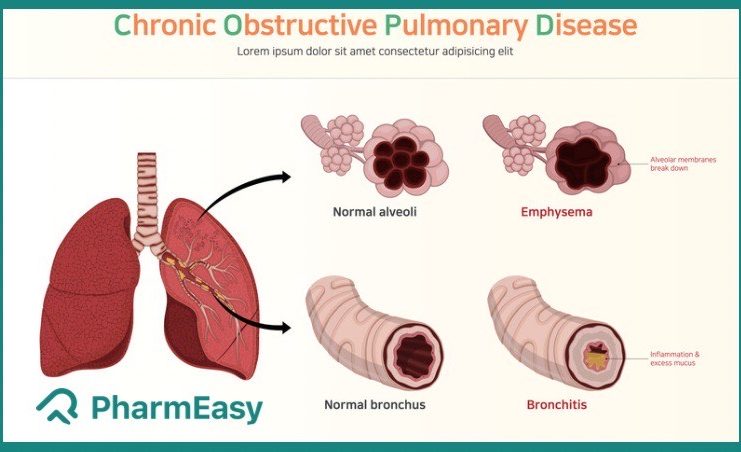5 Effective Strategies To Overcome COPD Fatigue
By Dr. Nikita Toshi +2 more

Get more insightful and
helpful tips to
treat Diabetes for FREE



Download PharmEasy App




Register to Avail the Offer
Send OTPBy continuing, you agree with our Privacy Policy and Terms and Conditions
By Dr. Nikita Toshi +2 more
Life with COPD or Chronic Obstructive Pulmonary Disease can be gruelling. Routine, simple activities such as going for a walk or folding away laundry can consume all your energy. COPD is a long-term, progressive lung disease that includes conditions like emphysema and chronic bronchitis. This results in the narrowing of the airways, swelling of the air sacs in the lungs and difficulties in breathing.

The prevalence of COPD is so prominent that close to one individual is diagnosed with COPD every five minutes. COPD reduces airflow into your lungs, making the simple act of breathing difficult and arduous. Inevitably, the body tires easily. COPD fatigue is among the most experienced symptoms.
Table of Contents
Recognised as the largest contributor to the commencement of COPD is smoking, with about 90% of all COPD cases traced back to this source. Cigarette and cigar smoking, along with passive smoking, can increase the risk of COPD. Living conditions, such as poor ventilation and exposure to environmental pollutants, indoor fumes and smoke, also play a critical role. Although not in significant numbers, genetic contributors have also been known to influence COPD.
COPD-related fatigue, for example, can be caused by factors such as oxygen deprivation, overall reduced strength and endurance and complications or comorbidities such as heart failure or depression. Fatigue is the second most common symptom patients with COPD report; however, it remains underdiagnosed and undertreated.
Dr. M.G. Kartheeka, MBBS, MD
COPD fatigue must be understood to battle it. The feeling of sluggishness occurs due to a series of reactions triggered by a lack of oxygen supply. Due to the body’s inability to inhale an adequate amount of oxygen, the onset of fatigue is quicker. With lower oxygen levels in the body, the person tends to lose stamina, avoid physical tasks and struggle with daily tasks. Depression and social disengagement are also COPD symptoms.
Since there is no proven cure for COPD, management is the best solution. Inhalers, too, are an optimal prescription to help ease easier breathing. They can help by widening airways or reducing swelling in the lungs. Almost immediately, one can notice a significant difference in the levels of oxygen in the body, as well as a revitalised mood and energy. Here are some easy lifestyle modifications recommended for COPD management:
Conscious breathing: Breathing exercises can help improve inhalation patterns and allow better oxygen circulation. Practising slow, calculated breathing through the lips can help relieve shortness of breath and drop carbon dioxide.
Nutrition is critical: Complex carbohydrates can help release energy slowly and protein-rich foods help build and maintain muscle tone. Multivitamins, taken after consulting your physician, can help increase energy levels. Limiting intake of artificially sweetened foods, foods rich in saturated fats and processed foods. This will help you feel lighter and more agile. Dietary fibres are another great source that can help regulate your digestive processes and keep you feeling fit and active.
Exercise, but with caution: This may be particularly hard for someone who is already battling fatigue, but exercise has proven benefits in circulating oxygen through the body. What’s more, exercise is a great mood enhancer and can help you feel more motivated to push yourself and feel emotionally stronger.
Treat comorbidities: COPD can frequently exist alongside other complications. Often, people with COPD may develop other health issues even when they do not have them. It is imperative that you get regular health check-ups and speak to your doctor about symptoms or problems you experience. Treatment options for conditions like sleep apnea can be found.
Schedule and plan ahead: Planning and optimal scheduling are crucial for COPD management. Adequate rest, breaking down larger activities into smaller achievable goals, can help manage the level of fatigue. Scheduling can also help prepare for emergencies, which can be exhausting both mentally and physically.
It is possible to maintain and improve the quality of life you enjoy with COPD fatigue. Work with your doctor to devise ways to enjoy a more active, fulfilling and healthy lifestyle.
Lung disease symptoms may make you afraid to exercise, but it’s actually good for your lungs, it is unlikely that pulmonary function limits a person’s ability to exercise, unless they have a disease that specifically impairs lung function such as asthma, bronchitis, or emphysema.
Dr. Ashish Bajaj – M.B.B.S, M.D.
Brought to you by Cipla.
Also Read: Felty Syndrome: Symptoms, Causes, and Research-Backed Treatment Options
Disclaimer: The information included on this site is for educational purposes only and is not intended to be a substitute for medical treatment by a healthcare professional. Because of unique individual needs, the reader should consult their physician to determine the appropriateness of the information for the reader’s situation.
Comments